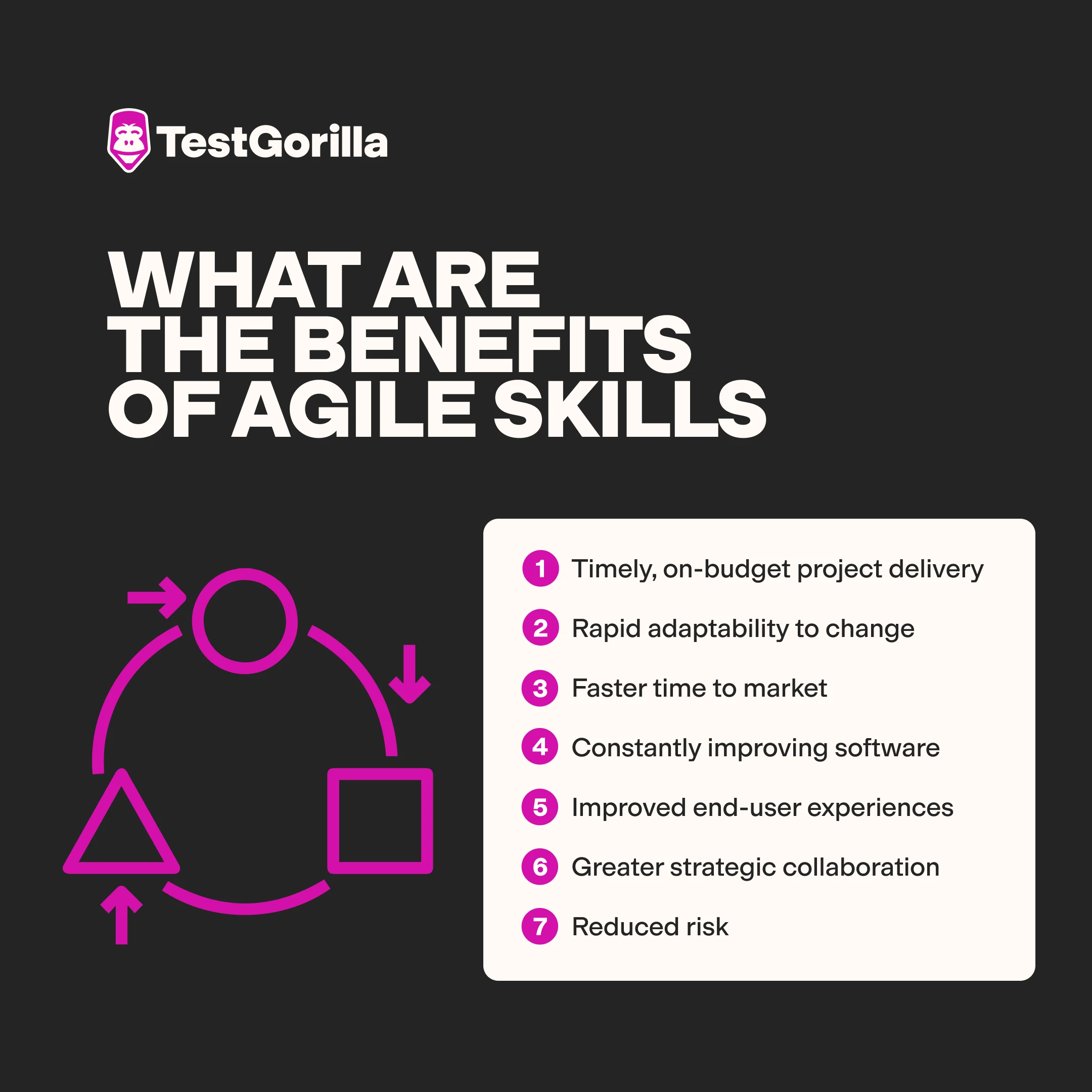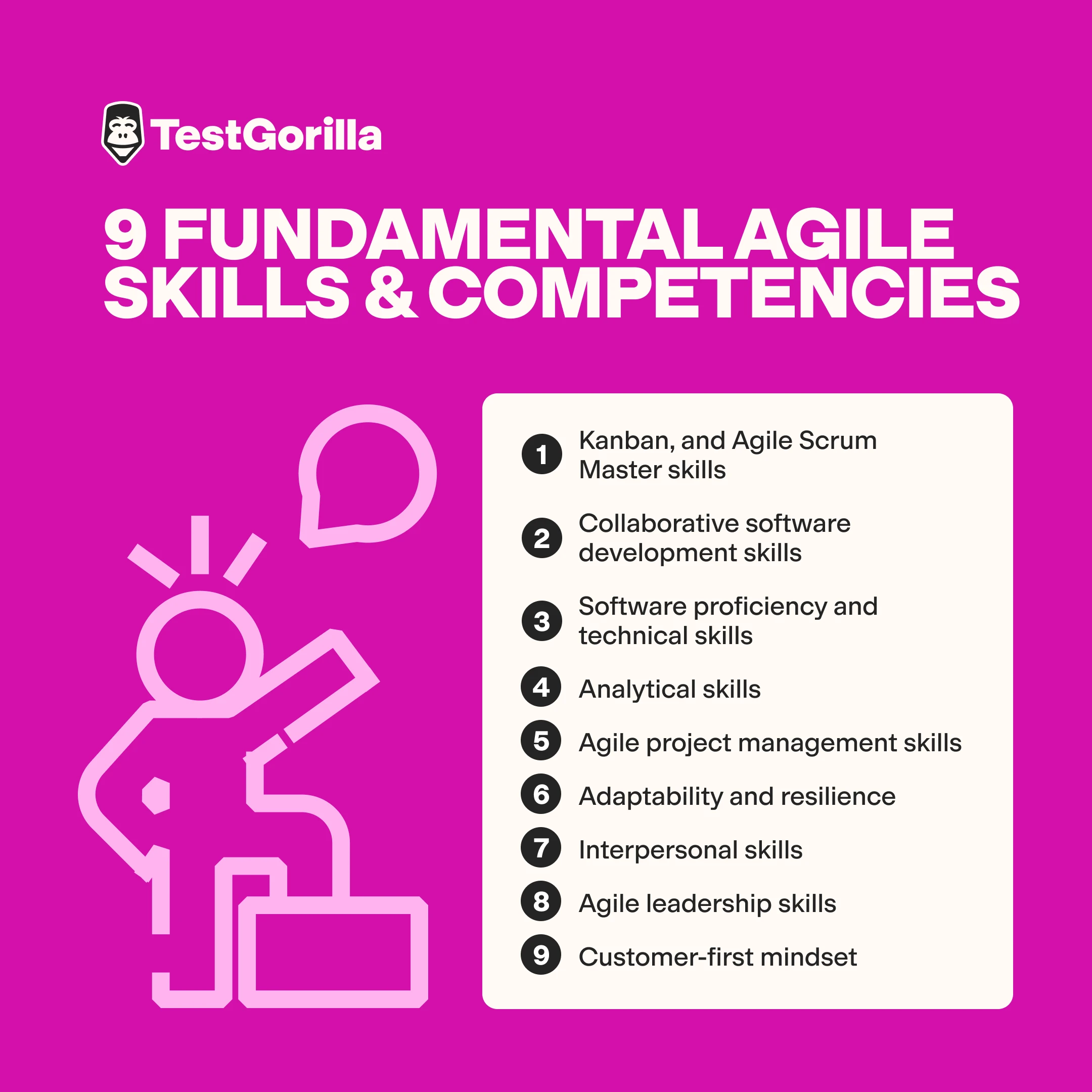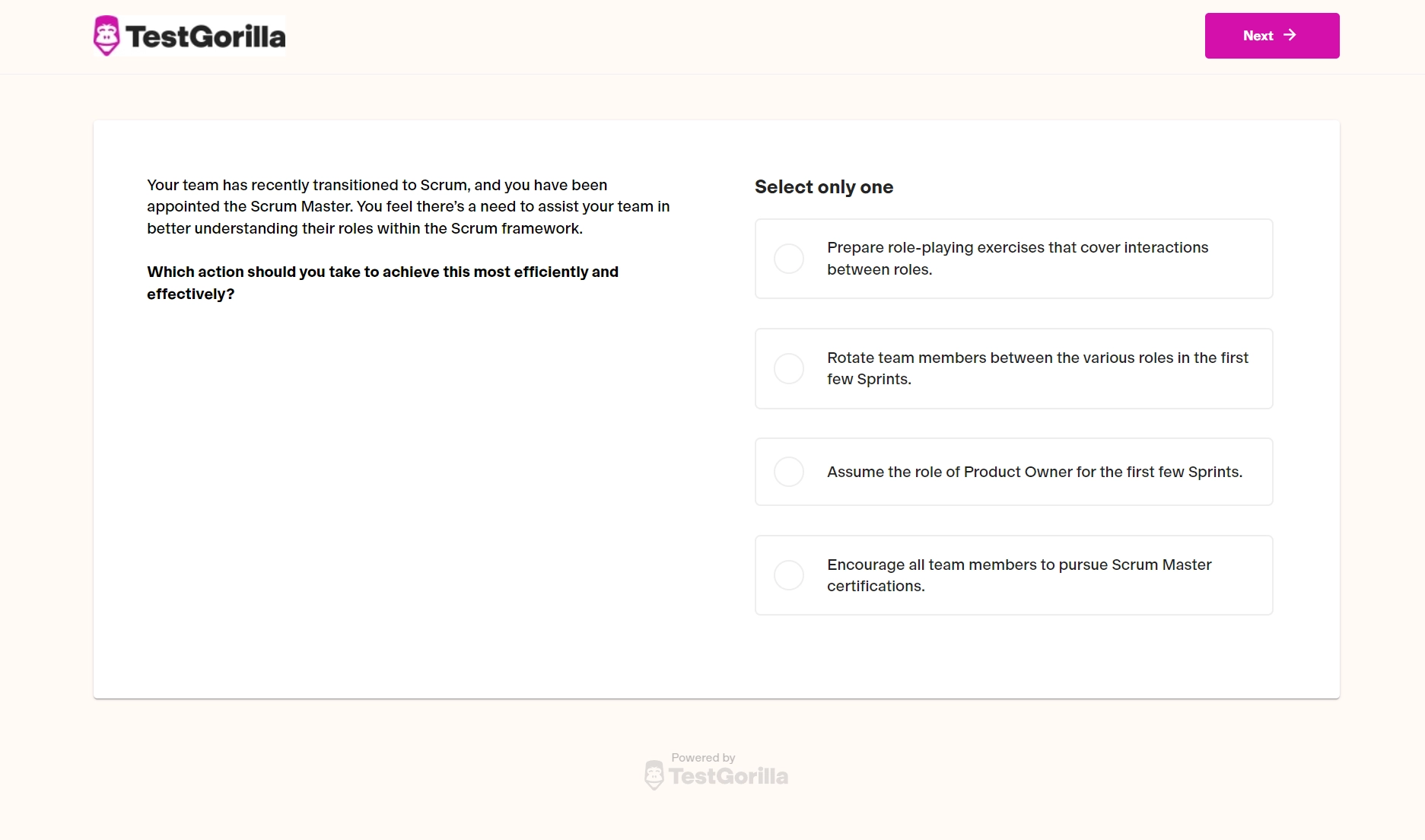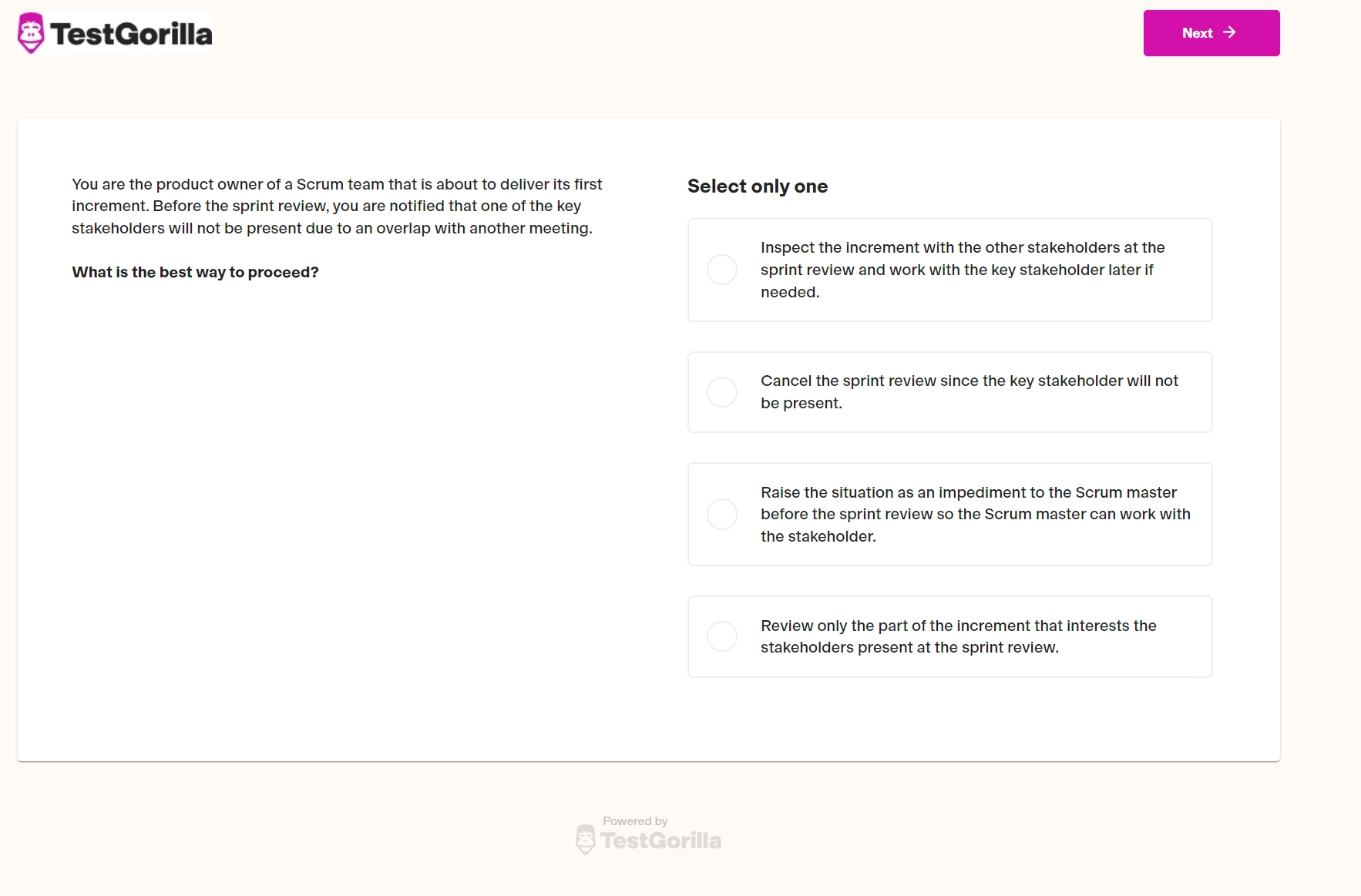Test candidates for Agile skills with talent assessments
Agile skills are fundamental in software development. The Agile approach, emphasizing speed, iteration, and efficiency, enables teams to improve product quality and refine user experiences rapidly.
However, determining if a candidate has the right Agile skills can be a real headache. That’s where a talent discovery platform like TestGorilla comes in. An Agile skills assessment offers a reliable insight into a candidate's abilities and competencies.
This article discusses the value of Agile skills, how to evaluate them, and how to hire the right experts for your team.
Why are Agile skills important?
According to the 15th State of Agile report by Digital.ai, 64% of professionals believe Agile skills help them adapt rapidly to shifting priorities and accelerate the continuous delivery of software. Agile skills can even improve business profitability.
Agile developer skills, Agile leadership skills, and Agile methodology skills lead to numerous benefits such as:
Benefit | Description |
Timely, on-budget project delivery | Developers with Agile technical skills excel at managing time, meeting deadlines, and adjusting to changing circumstances. |
Rapid adaptability to change | Technology, customer preferences, and market dynamics are always evolving. Agile developers can capitalize on new trends and opportunities faster than their peers. |
Faster time to market | Agile project management skills help developers prioritize tasks effectively, create minimum viable products quickly, and deliver value to customer satisfaction rapidly. |
Constantly improving software | Developers with sharp Agile skills stay laser-focused on software improvements. They continuously fine-tune software with each patch, update, and release. |
Improved end-user experiences | Agile developers thrive on feedback, adapting software to address genuine customer needs and pain points. This leads to better customer experiences, helping to generate brand loyalty and increase revenue. |
Greater strategic collaboration | Agile developers prioritize the human aspect of development. They’re team players who collaborate, communicate, and work cooperatively towards common goals. |
Reduced risk | Agile development reduces the chance of project failures, missed deadlines, and budget overruns because Agile teams adapt quickly. |
9 fundamental Agile skills and competencies
So, what are the Agile skills hiring managers should be screening for?
The competencies that matter most to your company depend on the role and responsibilities of your Agile developers. However, certain Agile skills are valuable for any organization building an innovative development team.
Let’s explore them.
1. Kanban, and Agile Scrum Master skills
Over time, developers learn how to implement various Agile methodologies and frameworks, from extreme programming to lean development.
However, Scrum and Kanban are the most popular product management methodologies. According to one report, 87% of Agile teams use Scrum, and 56% use Kanban.
The Scrum framework involves taking an incremental approach to problem-solving. Small teams work together in short cycles known as “Sprints” – testing, improving, and fixing issues.
The Kanban framework, frequently used alongside Scrum, enables Agile teams to visualize and manage work processes. Kanban software helps organize projects and tasks into columns in a table.
As each task is completed, it is moved from one column to the next. This system exposes the dependencies between tasks and helps reveal development constraints.
Agile developers can build Agile Scrum Master skills and additional expertise by using software such as Asana, Jira, or Trello that facilitates Scrum Sprints and Kanban project organization.
2. Collaborative software development skills
Agile development skills, such as test-driven development, pair programming, and analytic reasoning, are critical to building software quickly.
Agile employees know how to apply various engineering principles to software development and regularly work collaboratively with other experts. In Agile teams, small groups of members with complementary skills work together on a single feature at a time.
This creates a built-in mechanism for constant code reviews, reducing the time it takes to develop software and enabling team members to learn from each other.
Though Agile teams work cooperatively, each member still takes ownership and accountability for their specific tasks. They understand how their work affects others and how delays or issues can disrupt the production cycle.
Because all team members understand their impact on the project and can turn to others for help, companies can often reach deadlines and goals faster.
3. Software proficiency and technical skills
Hiring managers should screen candidates for software proficiency, one of the most important Agile skills. Agile employees use various tools on a day-to-day basis, such as:
Collaboration and communication tools: Slack, Microsoft Teams, Zoom, and Confluence are tools for creating, sharing, and discussing content.
Project management tools: Software like Jira and Wrike help employees track task progress and adhere to deadlines.
Code development tools: Coding services like GitHub and Jenkins support the creation of various software iterations and versions.
In addition to understanding how to use these tools effectively, Agile teams need various other technical skills to complete their tasks.
Members should be proficient in Agile database management if they lead Agile teams. They may also need knowledge of Agile software development best practices.
4. Analytical skills
Agile development teams commit to continuously improving software, introducing new features, and eliminating bugs.
To improve their products, they must constantly test software functionality, gather data about potential issues or user experience problems, and experiment with different solutions.
Agile team members regularly measure and analyze software performance using testing strategies, validation, and documentation. They also monitor the success of their Agile methods, tracking important metrics like Lead Time, Cycle Time, and Sprint Burndown.
Strong analytical skills empower Agile professionals to detect potential roadblocks, solve problems, and rapidly identify improvement opportunities.
5. Agile project management skills
Project management skills ensure professionals can plan, organize, and oversee projects effectively from beginning to end.
Agile teams focus on ensuring projects are delivered on time and within budget. Agile project management often begins with defining the project's scope.
Team leaders determine the project’s objectives, deliverables, and the work the rest of the team must do. This helps teams identify and manage risks that may emerge throughout the project lifecycle.
Once the project scope is identified, requirements are broken into smaller pieces, which the team prioritizes based on their importance.
For instance, a team working on new collaboration software might first design a system for assigning roles to users. Then they move on to designing chat systems and messaging threads before progressing to other features.
Throughout the project, the team reflects on their accomplishments and overall goals, and adapts to changing priorities.
6. Adaptability and resilience
Constant change is a standard part of software development processes – client requirements evolve, project objectives transform, and new technology trends like automation emerge.
Developers with Agile skills are comfortable handling these evolutions. They adopt a growth mindset, remain flexible, and feel confident when suddenly changing directions.
Adaptability doesn’t just mean being able to switch directions on a whim. It’s also about innovating, problem-solving, and approaching challenges with a positive and proactive attitude.
Agile professionals ensure they remain adaptable by constantly learning, gathering feedback, and expanding their knowledge. They possess strong emotional intelligence and resilience, which helps them handle change.
They’re also excellent at assessing, identifying, and mitigating risks throughout the project lifecycle, ensuring projects stay safe and on course.
7. Interpersonal skills
When assessing Agile development skills in candidates, many companies may overlook the importance of interpersonal skills. However, Agile developers need to interact effectively with many different people.
They need to communicate efficiently with other team members, translating complex technical concepts into easy-to-understand terms.They should be able to articulate their ideas clearly, listen actively, and work well within a team.
Agile employees also need to connect with stakeholders and clients regularly. They need to create status reports summarizing a project's progress and communicate with executives about issues, risks, and mitigation plans.
They may also need to discuss project requirements with clients and demonstrate empathy and emotional intelligence when issues arise.
Emotional intelligence also ensures that developers can deal with the stress, conflicts, and complex dynamics of a fast-paced development lifecycle.
8. Agile leadership skills
Each member of an Agile team should be able to guide the rest of their team when necessary – encouraging collaboration, promoting a culture of trust, and inspiring others to do their best work.
Certain team members may need Agile Product Owner skills, so they’re effective at guiding Scrum Sprints and acting as liaisons between clients and development teams.
When developing an Agile assessment test, HR managers should look for professionals who show the qualities of an effective leader.
The best candidates should be able to coach, motivate, and inspire other team members, use critical thinking to make effective decisions, and even navigate conflicts easily.
9. Customer-first mindset
Agile developers also need a customer-first or customer-centric mindset. The best software developers deliver excellent remedies because they understand their customers' needs and pain points.
They forge close connections with their clients, gathering constant feedback to implement iterative improvements.
Many Agile developers also create “User Stories” and “Journey Maps,” which help them imagine themselves in their customers' shoes and adjust their Agile processes to achieve specific outcomes.
The best insights on HR and recruitment, delivered to your inbox.
Biweekly updates. No spam. Unsubscribe any time.
How to assess Agile skills and traits
Now, let’s discuss how to assess Agile skills and traits. TestGorilla offers several tests you can use to find your next Agile developer.
These tests enable skills-based hiring, providing an overview of the candidates’ personalities, strengths, and weaknesses. With a customized Agile assessment test from TestGorilla, HR teams can screen candidates for hard and soft skills.
Here’s a look at five of the best tests for Agile skill assessment.
1. Scrum Master test
Since Scrum is the most popular Agile framework used in product management and software development, it makes sense to analyze Agile Scrum Master skills.
The TestGorilla Scrum Master test evaluates a candidate’s knowledge of the Scrum methodology and how well they can apply it to specific situations. With it, you can assess a candidate’s knowledge of Scrum practices, principles, roles, and artifacts.
HR leaders can also use the questions in this test to inspire them when writing intuitive Scrum Master interview questions.
2. Software Engineer test
Developers need a solid understanding of various programming languages like Java or Python, software development methodologies, debugging, and testing.
With our Software Engineer test, you can measure prospective developers’ abilities in these areas.
The test covers a comprehensive range of topics – from computer science and software design fundamentals to algorithms and data structures – to ensure your potential hire is proficient enough to do their job well.
If you’re hiring architects for software developers rather than engineers, you might switch this test with TestGorilla’s Software Architect test to measure a candidate's understanding of design patterns, development methods, and architectural styles.
Start screening the best Agile developers with TestGorilla
Skill tests give you valuable insight into which Agile developers can effectively integrate into your team and deliver quality work. Get started for free.
3. Product Owner test
The Product Owner plays a vital role in the Scrum framework. They are responsible for maximizing the value of the product being developed by the Scrum team.
They act as a liaison between the customer and the development team to ensure that everything produced is what the customer wants or needs.
TestGorilla’s Product Owner test measures a candidate’s knowledge of Product Owner roles, responsibilities, and best Agile practices. It helps you find candidates who can effectively bridge the gap between customers and the development team.
Click here to see more preview questions from this test.
4. Enneagram test
An Enneagram test in an Agile skills assessment helps you understand a candidate’s personality traits and behaviors.
The Enneagram is a model that divides people into nine personality types. Each type has its own motivations, fears, and ways of dealing with things. Insights into your candidate’s Enneagram type can also help validate soft skills.
You can learn more about how candidates communicate, collaborate, identify problems, and manage their time. An Enneagram test can even help you find more adaptable, resilient candidates who can thrive in stressful situations.
Using the Enneagram test, you can make better hiring decisions and create a teamwork culture that values diversity, improves team relationships, and helps projects succeed.
5. Project Management test
Effective project management skills are crucial for Agile teams. With the TestGorilla Project Management test, HR teams can identify whether candidates can effectively define project scope, allocate company resources between employees, and adhere to deadlines.
The test examines how well Agile employees can manage project schedules, communicate throughout all stages of a project lifecycle, and take accountability for their tasks.
A candidate who performs well on this test is more likely to be able to develop software and complete tasks quickly and efficiently without compromising on excellent outcomes.
Summary: The 9 top Agile skills and how to test for them
We recommend creating a talent assessment with five complementary tests for the best results. Depending on the type of Agile candidate you want to hire, you might use four of the tests above and add another more role-specific test.
For instance, if you’re hiring an Agile Project Manager, you could combine the Project Management test, Enneagram test, Product Owner test, and Scrum Master test. Then, you might add a Leadership skills test, Critical Thinking test, or Business Ethics test.
Here’s a summary of the best ways to test for each Agile skill:
Agile skills | How to test for them |
Kanban and Agile Scrum Master skills
| - Use the TestGorilla Scrum Master test to identify knowledge of Scrum practices, roles, and artifacts - Examine candidate proficiency with Kanban boards and charts |
Collaborative software development skills | - Test for collaborative skills and collaborative personality traits with the Enneagram test - Ask behavioral interview questions to assess how candidates work in a team |
Software proficiency and technical skills | - Use the Software Engineer test or the Software Architect test to assess a comprehensive range of topics - Use specific software tests to examine knowledge of tools like Jira, Confluence, Microsoft Office, and similar solutions |
Analytical skills | - A Scrum Master test can offer insights into a candidate's ability to analyze situations and determine when to apply Scrum Techniques - Implement cognitive skill tests, such as critical thinking, problem-solving, numerical reasoning, and computational thinking |
Agile project management skills | - Use TestGorilla’s Project Management test - Ask behavioral questions that examine a candidate’s approach to leading projects in an Agile environment |
Adaptability and resilience | Leverage personality tests like the Enneagram test to examine a candidate’s adaptability, resilience, and ability to handle stress |
Interpersonal skills | Use personality and culture tests, such as the Enneagram Test, and test communication skills with written and spoken communication tests |
Agile leadership skills | - A Project Management test helps identify how well leaders can lead teams through projects - Use leadership and people management tests to evaluate a person’s ability to guide and inspire others in a team |
Customer-first mindset | - Experiment with personality tests such as the Enneagram test and situational judgment tests - Consider an account management test for team leaders |
Start screening for Agile Skills with TestGorilla
Test a range of skill sets related to software engineering, leadership, personality traits, and more with TestGorilla today.
How to develop Agile skills
Developing Agile skills in your team members or improving your skills as an Agile employee requires a commitment to continuous learning and improvement.
Here are some areas to focus on:
Kanban and Agile Scrum Master skills
Review the Agile Manifesto and its 12 Agile principles
Practice using frameworks like Scrum and Kanban in workflows
Take courses on Scrum Sprint planning, Kanban board development, and Agile testing
Analytical skills
Review previous project documentation and search for patterns and trends
Take critical thinking courses and problem-solving workshops
Agile project management skills
Experiment with project management tools like Trello and Asana
Develop analytical skills to ensure you can effectively identify a project’s scope and requirements
Build timeline management skills and focus on Product Backlog prioritization and task delegation
Interpersonal skills
Hone your verbal and nonverbal communication skills
Improve body language and watch your tone
Practice active listening and develop emotional intelligence by empathizing with others
Engage in small, fast-paced projects with team members from different departments
Agile leadership skills
Become a mentor to practice Agile coaching and guiding team members
Develop resilience by regularly assessing your strengths and weaknesses and looking for improvement opportunities
Volunteer to lead project Sprints and brainstorming sessions
Find candidates with Agile skills
Agile developers drive continuous improvement, contribute to efficiency, and reduce business risks – bringing adaptability and innovation to your company.
Learning to assess Agile skills means leveraging the right tests to validate and understand candidates' traits, competencies, and abilities.
TestGorilla’s wide range of tests offers a comprehensive, accurate, and efficient way of assessing Agile skills. With a bespoke skill assessment, you can evaluate all the soft and hard skills that matter most for your role.
Sign up for a Free forever plan to explore free assessments like our incredible Communications skills test.
Take a product tour for a behind-the-scenes look at how talent assessments work.
Book a live demo for guidance on how to build the ideal Agile skills assessment strategy.
Agile skills FAQs
Do you still have a few questions about Agile skills? Find the answers to four commonly asked questions below:
What are Agile skills?
Agile skills are the competencies that enhance a developer’s ability to adapt quickly, create products iteratively (based on feedback), and manage projects efficiently. These skills are highly valued across industries, as they help to accelerate product development lifecycles, streamline customer experiences, and increase business revenue.
What is an Agile skills assessment?
An Agile skills assessment evaluates skills individuals need to work well in a fast-paced software development setting. It measures candidates’ ability to collaborate, be flexible and adaptable, think in steps, solve problems, and communicate effectively. It may also examine specific technical skills, like Scrum mastery or project management skills.
How can you be Agile at work?
Employees can be more Agile at work by:
Focusing on speed, efficiency, and rapid iteration
Learning to communicate and collaborate effectively
Listening actively to other team members and clients
Practicing Agile methodologies and frameworks like Scrum
Adopting a Growth Mindset and committing to lifelong learning
You've scrolled this far
Why not try TestGorilla for free, and see what happens when you put skills first.

























